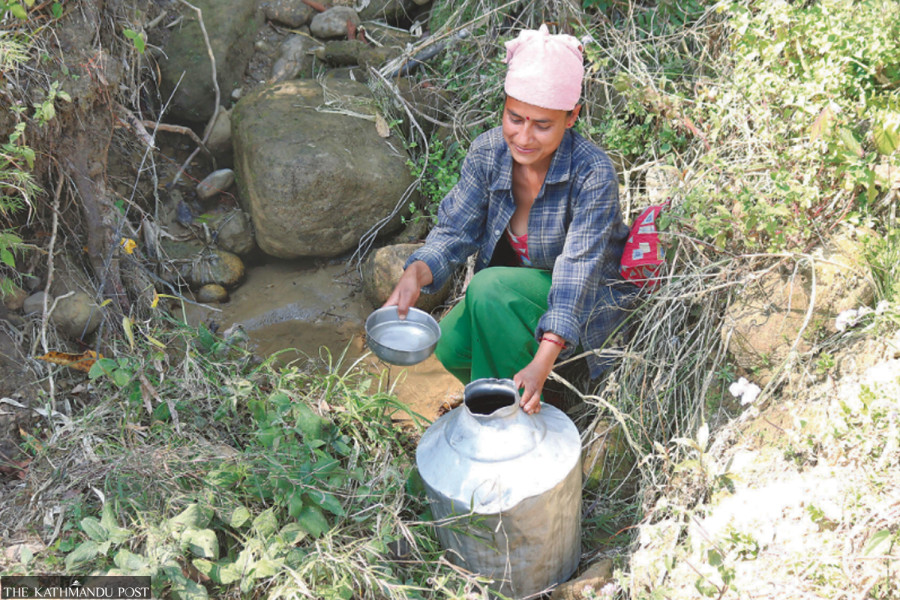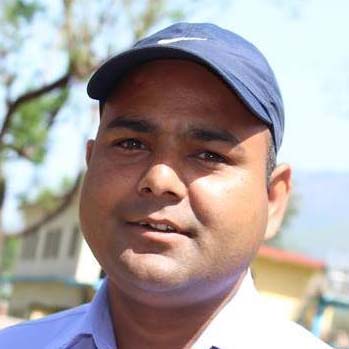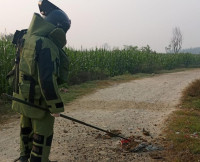National
Karnali villages are emptying as water sources dry up
Of 366,370 households in the province, only 130,000 have reliable access to drinking water.
Krishna Prasad Gautam
Nanda Jaisi, an 80-year-old woman from Rekcha in ward 5 of Chaukune Rural Municipality in Surkhet, has a family of ten. But despite the big family size, the Jaisis get only two buckets of water for drinking, cooking, and cleaning, and other daily necessities.
In Rekcha, each household, regardless of its size, gets only two buckets of water a day. According to Jaisi, there were around 200 families in the village a decade ago, but only 80 remain after most wells and other natural sources of water dried up.
“There are 18 wells in Rekcha, and 12 of them have dried up. In the remaining six wells also, the water level is very low. Due to the scarcity of water in the village, many locals have migrated, and others are planning to leave,” said Jaisi.
“In order to fairly distribute water to the locals, the villagers have hired a watchman who ensures every household gets only two buckets of water. Despite our continued efforts, we have not been able to revive the other wells, and even the active ones are slowly drying up,” Jaisi added.
Jiten BC, another local from Rekcha, said that locals are always worried due to the scarcity of water. Nobody gets enough water to even quench their thirst in the village.

“Some locals have two houses, one in Rekcha and the other in the nearby villages of Kalikot and other neighbouring districts, and they migrate seasonally to other places during the dry season,” said BC. “But there are also poor people who have nowhere else to go. These locals with no other option endure hardships in the village,” said BC.
Some three years ago, the construction of a Lift Drinking Water Supply Project was started in Rekcha with an investment of Rs12.6 million from the Karnali provincial government.
According to Khadak BK, chairman of Chaukune Rural Municipality, the construction stopped shortly afterwards due to electricity shortage.
Chaukune Rural Municipality is located in a hilly area with limited road access.
“The water supply project has stalled due to the absence of a road to transport the transformer needed for supplying electricity to the project,” explained BK. “Both roads and electricity are essential for this project, and at least Rs5 million is needed to build a road up to the hill where the source of water for the project is located.”
“But the rural municipality has not been able to allocate a budget for road construction.”
Likewise, the residents of Kochhate in ward 2 of Kalimati Rural Municipality, Salyan, are grappling with the same problem.
Bhadra Bahadur Gharti, a local of Kochhate with a family of five, articulated the distress of the village located atop a hill where water sources are drying up.
According to Gharti, there were more than 500 families in the village, but currently there are only 40.
“We have to trek downhill for over an hour to reach the local Ghatikhola stream, and it takes nearly two hours to return home carrying the water on our backs,” said Gharti.
“My wife also comes along, no matter what day it is or the situation. We are unable to migrate elsewhere both due to lack of money and sentimental attachment to the place, it is my birthplace,” Gharti added.
Due to a lack of drinking water, most hilly settlements in Karnali Province have started to empty out. According to the National Census 2021, out of 366,370 households in Karnali, only 130,000 families have reliable access to drinking water.
Prem Jaisi, a local farmer resident of Kudu village in ward 8 of Bheri Municipality, Jajarkot, said that more than 200 locals, many of them his friends, have moved away.
“There were 800 families in the village, and several have migrated from here. Also, others are planning to leave due to the scarcity of water. In our village, most locals are farmers, and due to a lack of water in the field to grow seasonal crops, many have left,” said Prem.
Similarly, the Chakhlemela village, located in Sanibheri Rural Municipality in the neighbouring Rukum West district, is grappling with water shortage.
Bir Bahadur Bista, chairman of Sanibheri Rural Municipality, says that due to lack of water, more than 80 families have migrated from Chakhlemela in the past five years.
“In the past couple of years, many families have migrated, and there are more than 50 migration applications pending in the office,” said Bista.

According to the National Census of 2021, only 35.64 percent inhabitants of Karnali have access to reliable sources of drinking water. Also, about 96.5 percent of families have not been tested for water hygiene. Out of 366,370 households, 235,000 households rely on alternative water sources, while 4,276 households rely on water from the river throughout the year.
According to the Ministry of Energy, Water Resources, and Irrigation of Karnali province, about 1,600 water supply projects remain stalled due to lack of budget.
Karnali province is otherwise rich in freshwater sources, including 1,459 glaciers spanning 1,023 square kilometres.
Kalanidhi Paudel, joint secretary of the Ministry of Energy, Water Resources, and Irrigation, Karnali Province, said that the water from the 264-kilometre-long Bheri River and the 68-kilometre-long Tila River is being wasted.
According to Paudel, the provincial government must protect the water of Karnali through an appropriate water policy. Big plans for using water in Karnali have also stalled for a long time.
“The federal government had allocated Rs20 million in the fiscal year 2022-23 and Rs60 million in the last fiscal year for drinking water projects, but the funds went unspent. Also, Rs500 million allocated by the provincial government last year could not be spent,” said Paudel.
“Even the budget of Rs6 million allocated by the World Bank for the Birendranagar Lift Water Project has faced multiple delays due to the incomplete engineering design and Initial Environmental Examinations (IEE), among other things.
Rishi Khanal, a member of the Provincial Planning Commission, said the province has gotten only a small budget for drinking water because the allocations are made based on population. This fiscal year, around Rs900 million has been allocated for drinking water, according to him.
Khanal cites factors such as scattered settlements, geographical challenges, haphazard road construction, climate change and deforestation for the severe water scarcity.
Kamal Sharma, a Karnali-based climatologist, said droughts are more common due to less rainfall owing to climate change.




 22.59°C Kathmandu
22.59°C Kathmandu















